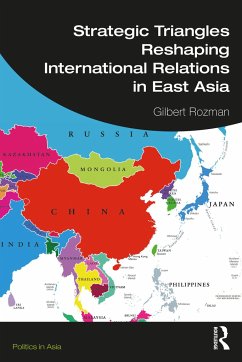
Identity, Culture, and Chinese Foreign Policy
THAAD and China's South Korea Policy
Versandkostenfrei!
Versandfertig in 6-10 Tagen
45,99 €
inkl. MwSt.
Weitere Ausgaben:

PAYBACK Punkte
23 °P sammeln!
This book assesses the role of identity and Chinese face culture in Chinese foreign policy by analyzing China's political and economic retaliation against South Korea's deployment of the THAAD (Terminal High Altitude Area Defense) system on its soil.By examining the history and military action of China, Japan, and North and South Korea, the book argues that China's divergent responses were caused by different expectations according to whether states had a perceived identity as a friend or a rival. The author demonstrates that Chinese face culture shapes China's reaction to others through three...
This book assesses the role of identity and Chinese face culture in Chinese foreign policy by analyzing China's political and economic retaliation against South Korea's deployment of the THAAD (Terminal High Altitude Area Defense) system on its soil.
By examining the history and military action of China, Japan, and North and South Korea, the book argues that China's divergent responses were caused by different expectations according to whether states had a perceived identity as a friend or a rival. The author demonstrates that Chinese face culture shapes China's reaction to others through three dynamics of seeking, saving, and losing face. This book shows how identity and culture have worked in the relationship between China and neighboring countries through three case studies exploring North Korea's Taepodong-2 missile launch and first nuclear test in 2006, South Korea's decision to allow the United States to deploy the THAAD around 2016, and Japan's decision to deploy two U.S. X-band radars in 2005 and 2014.
A timely analysis of the importance of identity and culture in international relations, the book will be of interest to scholars of Chinese foreign policy, Sino-South Korean relations, Sino-North Korean relations, Sino-Japanese relations, Korean Politics, Asian Politics, and International Relations.
By examining the history and military action of China, Japan, and North and South Korea, the book argues that China's divergent responses were caused by different expectations according to whether states had a perceived identity as a friend or a rival. The author demonstrates that Chinese face culture shapes China's reaction to others through three dynamics of seeking, saving, and losing face. This book shows how identity and culture have worked in the relationship between China and neighboring countries through three case studies exploring North Korea's Taepodong-2 missile launch and first nuclear test in 2006, South Korea's decision to allow the United States to deploy the THAAD around 2016, and Japan's decision to deploy two U.S. X-band radars in 2005 and 2014.
A timely analysis of the importance of identity and culture in international relations, the book will be of interest to scholars of Chinese foreign policy, Sino-South Korean relations, Sino-North Korean relations, Sino-Japanese relations, Korean Politics, Asian Politics, and International Relations.














